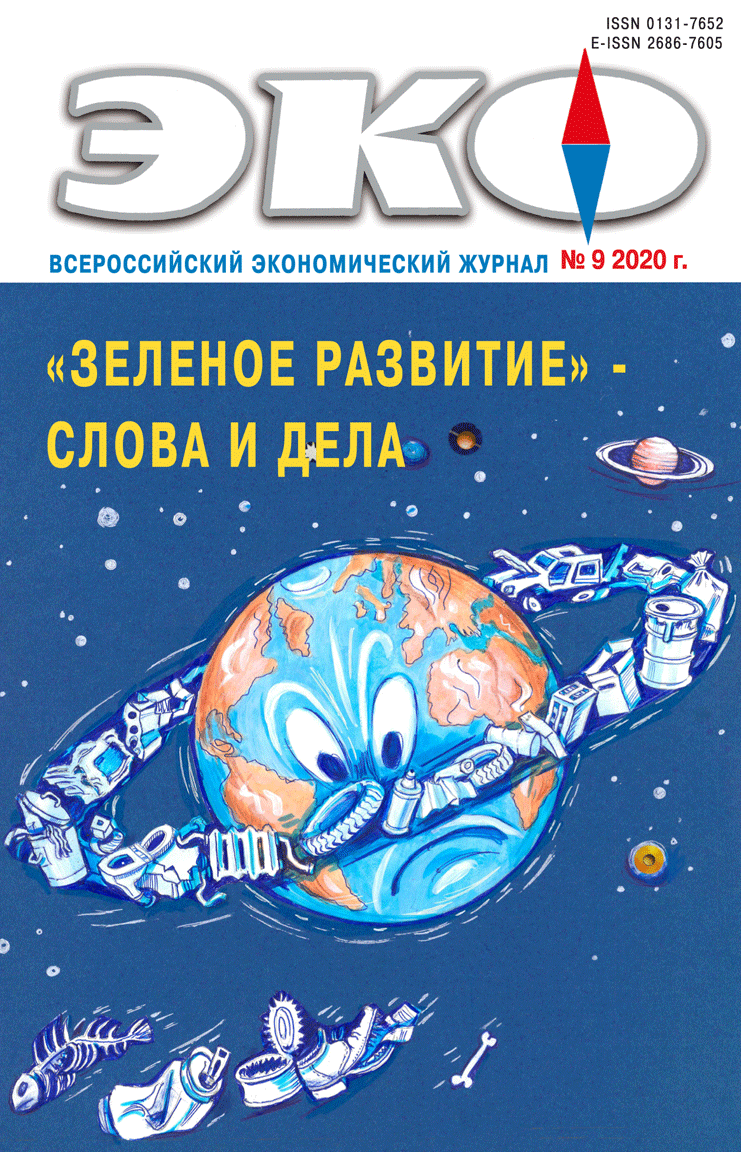Тема номера: "Зеленое развитие" - слова и дела
Published 2020-09-03
Keywords
- “polluter pays” principle,
- green growth,
- decoupling,
- eco-intensity,
- environmental institutions
How to Cite
1.
Glazyrina И. A Thorny Path to Green Economy. ECO [Internet]. 2020 Sep. 3 [cited 2026 Jan. 22];50(9):8-23. Available from: https://ecotrends.ru/index.php/eco/article/view/4104
Abstract
The paper examines an extent to which the existing institutions of environmental management in Russia contribute to solving the problems of transition to a “green” economy. It is shown that in a situation where payments are calculated in proportion to the volume of production, there are incentives to reduce eco-intensity, which is a positive factor. However, analysis and calculations show that this is not enough for “green” economic growth. It is advisable to set a threshold level of eco-intensity. In case of exceeding this level payments for negative impact significantly increase. One way to create incentives for green growth is to regularly lower this “regulatory threshold”. It is necessary that this decline occurs at a fairly high rate – the higher the rate of economic growth. Such high rates of environmental modernization require new institutional regulatory tools. A “road map” model for implementation of this mechanism is presented.References
- Бобылев С. Н., Соловьева С. В., Ситкина К. С. Индикаторы устойчивого развития Уральского региона // Экономика региона. 2013. № 2. С. 10–17. DOI: 10.17059/2013–2–1.
- Вольчик В. В. Восхождение метрик // Terra Economicus. 2018. Т. 16. № 4. С. 6–16.
- Забелина И. А., Делюга А. В. Геоэкологические индикаторы устойчивого развития: пространственный анализ // Устойчивое развитие горных территорий. 2019. Т. 11. № 1 (39). С. 15–25.
- Зелёная экономика и цели устойчивого развития для России / Под ред. С. Н. Бобылёва, П. А. Кирюшина, О. В. Кудрявцевой. М.; Экономический факультет МГУ имени М. В. Ломоносова, 2019. 284 с.
- Рюмина Е. В. Экологические аспекты оценки качества жизни // Экономика региона. 2016. Т. 12. № 4. С. 1113–1122.
- Тагаева Т. О. Совершенствование механизма экологических платежей с использованием результатов прогноза эколого-экономического развития РФ // Проблемы прогнозирования. 2011. № 3. С. 142–153.
- Тамбовцев В. Л. Управление без измерений // Terra Economicus. 2019. Т. 17. № 3. С. 6–29.
- Шкиперова Г. Т. Анализ и моделирование взаимосвязи между экономическим ростом и качеством окружающей среды (на примере республики Карелия)// Экономический анализ: теория и практика. 2014. № 43 (394). С. 41–49.
- Экологические индикаторы качества роста региональной экономики / Ред. И. П. Глазыриной, И. М. Потравного. М.: НИА-Природа, 2005. 306 с.
- Alcott B. Jevons’ paradox // Ecological Economics. 2005. 54(1). Pp. 9–21
- Baker S. The European Union: integration, competitions, growth and sustainability // Implementing Sustainable Development: Strategies and Initiatives in High Consumption Societies. 2000. Pp. 303–421.
- De Haan, M. Accounting for goods and bads. Voorburg, Statistics Netherlands. 2004. 216 p.
- Decoupling natural resource use and environmental impacts from economic growth. A Report of the Working Group on Decoupling to the International Resource Panel (2011). Available at: http:// www.gci.org.uk/Documents/Decoupling_Report_English.pdf (accessed 14 June 2019).
- Glazyrina I. P., Zabelina I. A. The Silk Road Economic Belt and green growth in the east of Russia // Journal of Resources and Ecology. 2016. № 7(5). Pp. 342–351.
- Glazyrina I. P., Zabelina I. A. Spatial heterogeneity of Russia in the light of the concept of a green economy: the social context //Geography and Natural Resources. 2018. № 39(2). Pp. 103–110.
- Glazyrina I. P., Faleichik L. M., Yakovleva K. A. Socioeconomic effectiveness and “green” growth of regional forest use // Geography and Natural Resources. 2015. Vol. 36. Issue 4. Pр. 327–334.
- Glazyrina I. P., Mikheev I. E., Eloyan A. Yu. Accommodation of Ecological and Economic Interests in Placer Gold Mining // Geography and Natural Resources. 2017. Vol. 38. № 3. P. 275–280.
- Glazyrina I. Р., Glazyrin V. V., Vinnichenko S. V. The polluter pays principle and potential conflict in society //Ecological Economics. 2006. 59(3). Pp. 324–330.
- Hovardas T. Two paradoxes with one stone: a critical reading of ecological modernization // Ecological Economics. 2016. № 130. Pp. 1–7.
- Jevons W. S. The Coal Question: an Inquiry Concerning the Progress of the Nation, and the Probable Exhaustion of our Coal-mines. New York, 1905. Macmillan and Co, 467 p.
- Kallis G., Kerschner C., Martinez-Alier J. The Economics of degrowth // Ecol. Econ., 2012. Vol. 84. Pp.172–280.
- Nagvi A., Zwickl K. Fifty shades of green: Revisiting decoupling by economic sector and air pollutants //Ecological Economics. 2017. 133. Pp. 111–126.
- Shang Yongmin, Si Yuefang, Zang Gang. Black or Green? Economic growth patterns in China under low carbon economy targets // Journal of Resources and Ecology. 2015. № 6 (5). Pр. 310–317.
- Victor P. The Kenneth E. Boulding Memorial Award 2014: Ecological economics: A personal journey, In Ecological Economics, 2015. Рр.109, 93–100.
- Warner R. Ecological modernization theory: towards a critical ecopolitics of change? //In Environmental Politics. 2010. № 19(4). Pp. 538–556.
- Wolfe M. Beyond “green buildings”: exploring the effects of Jevons’ Paradox on the sustainability of archival practices. // Archival Science. 2012. 12(1). Pp. 35–50.
- Zabelina I. A. Decoupling in environmental and economic development of regions-participants of cross-border cooperation // Economic and Social Changes: Facts, Trends, Forecast, 2019. № 12(1). Рр. 241–255.

